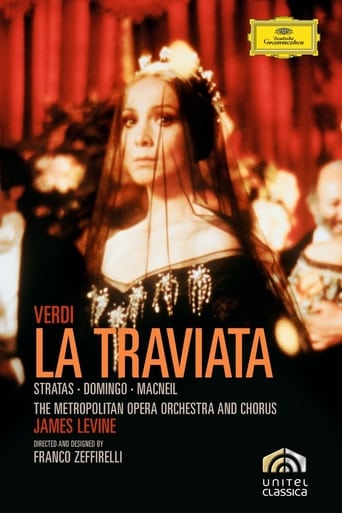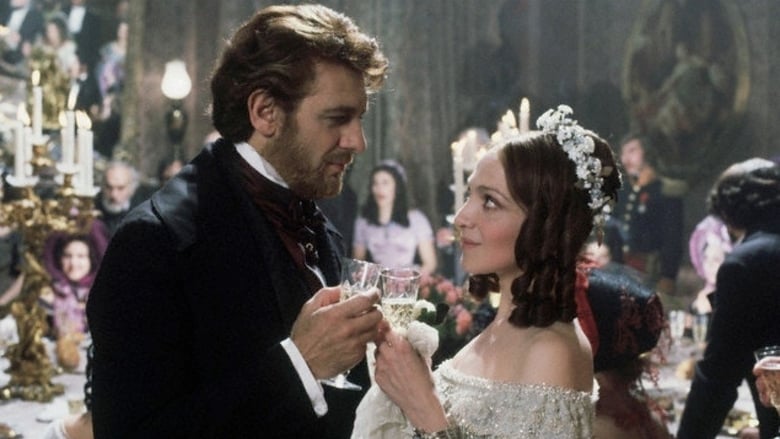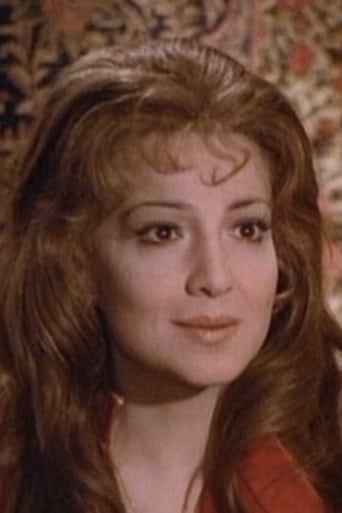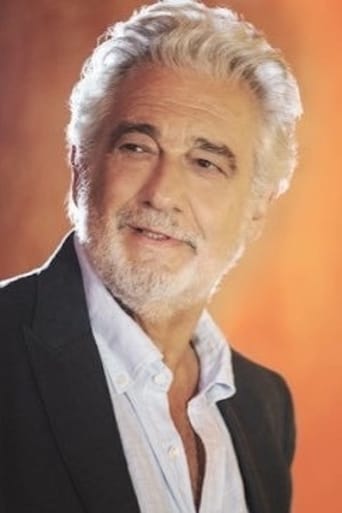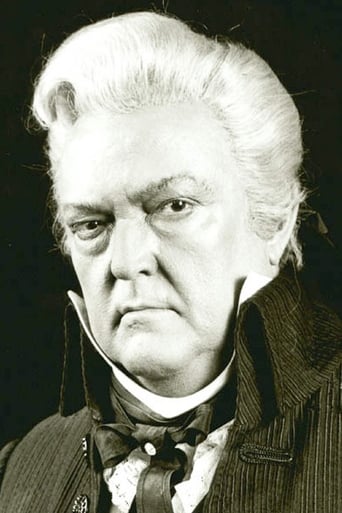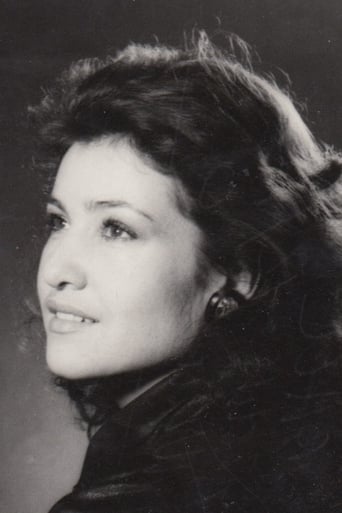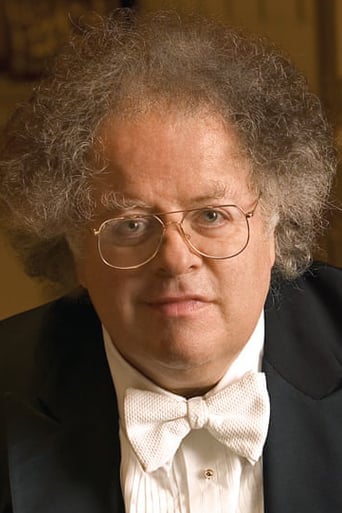This “Traviata” became one of the most succesful of all opera films, especially in France, where 800,000 Parisian cinemagoers flocked to it in the first six week. It was nominated for two Oscars (for production and costume design) and won BAFTAs in those two categories, as well as receiving BAFTA and Golden Globe nominations as 1983’s Best Foreign-Language Film.


Similar titles

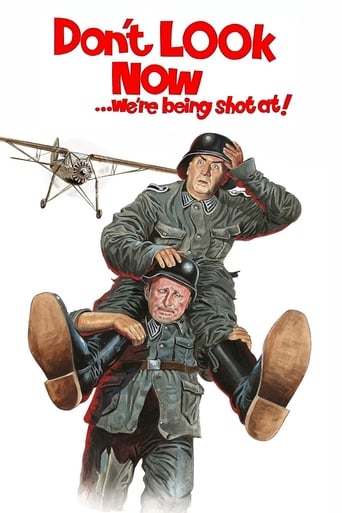
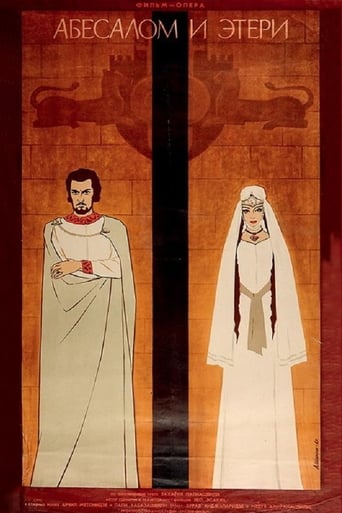

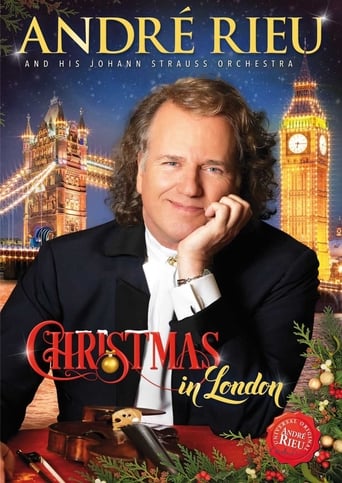
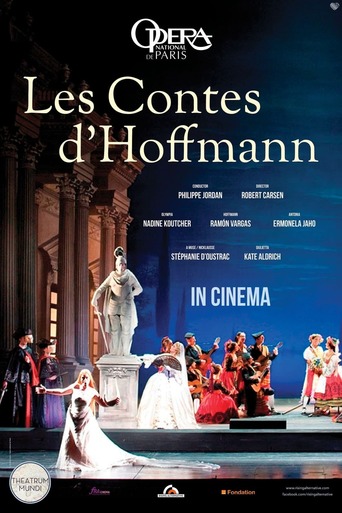
Reviews
This version of the famous tearjerker La Traviata was just wonderful from beginning to end. The cinematography was stunning, and just as luscious were the costumes and locations, especially the villa outside Paris. The music by Verdi is just superb, no wonder it is one of the most performed operas today, from the prelude of Act 1, Brindisi(which I am sure everybody knows even if they're not into opera), Sempre Libra, Di Provenza to the heart-rending ending and especially the Act 2 duet between Violetta and Germont, it is just delightful, and is bound to bring tears to people's eyes like it did to me. The plot, based on the book by Alexandre Dumas Junior, is not too complicated and easy to follow. The performances are astonishing. Placido Domingo, not only looks the part of Alfredo, but sang and acted a dream, easily up there with Alfredo Krauss, as one of the best tenors playing that particular character. Teresa Stratus was perfection as Violetta. I did worry that her performance was going to leave me cold, but her beautiful voice and outstanding acting ability equalled a real tearjerker of a performance, that was poignant and understated. Cornell MacNeill is not a name I am familiar with, but he certainly shone as Germont, with a fine baritone voice, and good stage presence. Overall, a perfect opera film, that is a real tearjerker. 10/10 Bethany Cox
If one considers the love stories of all times, beside the undeniable classics by greatest playwrights, inevitably comes to mind the name of Alexandre Dumas (fils) who, in 1852, wrote a novel THE LADY OF THE CAMELLIAS. Since then, the endless love story set in the 19th century Paris has inspired both opera writers and movie directors. Consequently, the power of the tale embedded in the libretto by Francesco Maria Piave prompted opera maestro Giuseppe Verdi to write one of his most famous operas LA TRAVIATA basing his content entirely on the story about a deathly ill courtesan who, though does not have long to live due to tuberculosis, finds the true love of her life. What came out was a greatly successful work where only characters were renamed but where the audiences were provided with something special and timeless: glorious music.However, lots of modern viewers skip those classics easily reducing their knowledge to films only. More to say, the commercial nature of cinema hardly promotes any of this high rank entertainment. As a result, the question appears: is it possible to captivate, amaze and enthuse a pop corn generation's viewer with the staff of this sort? The Italian director Franco Zeffirelli managed to prove it possible through this production with some of his personal "additions" and, most importantly, with the magnificent leads: marvelous tenor Placido Domingo and astounding soprano Teresa Stratas. Though LA TRAVIATA has been staged and filmed several times so far, this version occurs to be the best one. Why? The first aspect that addresses the viewers, both opera buffs and modern genres' lovers, the aspect that highlights the very core of their emotions and experiences, are the visuals of the movie. From the very credits with the view of the Notre Dame Cathedral and the surroundings of the Seine River when the sounds of larks and pigeons mix with the sounds of crows, it all appears to be, as if, a moving work of art that you look at in perfect admiration and astonishment. The wardrobes together with sets and decorations of interiors are stunning to the very essence of visual feast. This effort taken in providing the viewer with vision's awe is magnificently executed throughout. There are plenty of moments one could enumerate praising their pearls and uniqueness but for me, personally, there are two sequences of greatest interest: the lavish party as a flashback of Violetta's delirious mind and her visit to the countryside where the nature seems to praise the sincere love as no one and nothing else. This goes with sublime music by Verdi, which is practically much more memorable for the viewers and their enthusiasm for the entire work of art. Opera is promoted by modern means. Therefore, some of the commentators are right saying "paradoxically" that this is an opera movie for people who hate opera.Besides, the whole cast fit very well to their roles. This refers both to the lead I have mentioned before as well as to the supporting cast. Placido Domingo as Alfredo Germont and Teresa Stratas as Violetta Valery were a perfect choice for the couple because of their attractiveness and the desirable chemistry. Cornell McNeil is excellent as Giorgio Germont the authoritative parent who, supposedly, cares for his son's future. The three memorably reach the "top notch" performances at the end when emotions are riding to the highest degrees... The supporting male and female roles, including a bunch of beautiful young maidens are easily recognizable and leave a personal impression in viewers.So to say, LA TRAVIATA is a true work of art, a mysteriously beautiful and subtly exquisite screen work that anyone should see. Referring to the words of Vincent Canby in New York Times who called this film "triumph" and found it "dazzling," I heartily recommend this masterpiece! Perhaps one of the greatest operas of all times and one of the very best productions by Franco Zeffirelli.
Director Franco Zefferelli, Stars Placido Domingo, Teresa Stratas, Cornell McNeil, Conductor James Levine and the Metropolitan Opera Orchestra, 1982 The forces behind this masterpiece are responsible for its greatness- Italian director and designer Franco Zefferelli, tenor Placido Domingo, soprano Teresa Stratas and baritone Cornell McNeil. The singers are at the top of their game, Domingo is a young, sexy Alfredo and Teresa Stratas IS Violetta Valery in a performance that even Maria Callas would envy. Zefferelli, who has long claimed he had a friendship with her and in truth he had been behind various opera productions of hers, had Maria Callas in mind when he cast Teresa Stratas. Like Callas, Stratas has a Greek background through her parents though she was Canadian born, has similar looks, has the same type of dramatic voice and she is in Zefferelli's own words "an electrifying actress and soprano of the lyric entertainment". The Callas connection is most obvious when Stratas appears in a black veiled gown in Act 2 at Flora's party where even her hair is similar to Callas' infamous 50's performances.Released in 1982, Zefferelli sought to "convert" people into opera lovers through the lush visual seduction of the cinema. This is exactly what he did. The cinematography of this film kills you with excessive beauty. The opening credits roll as we see scenes of Paris in the Notre Dame Cathedral area and surrounding residential district by the Seine river. The interior of Violetta Valery's mansion, where she hosts the Act 1 party, is luxurious and Zefferelli allows us to be dizzied with the sheer opulence of the house- gilded mirrors, portraits of Violetta, curtains, chandeliers etc. Visually on film we are able to tell things about the characters that stage performances do not, for example as the guests depart from Act 1's party, an old woman steals a silver box from Violetta proving to us that Violetta is not among real friends, these are only fair-weathered friends and bad ones at that. They were not even there for her when she was dying in the finale. Also noteworthy is the cruel trick one has to catch on early on. Violetta and Alfredo are never reunited, as in the opera, but instead his return is a hallucination and she dies alone in her apartment.The beginning of the film has Violetta reminiscing about the better days as a desirable and wealthy courtesan who partied all the time. She is deathly ill and already her house is sold and men are moving her things out. The country scenes are incredibly beautiful as Violetta and Alfredo live happily in seclusion. Alfredo rides his horse and Violetta picks flowers for her greenhouse and feeds her white doves in their big cage. Cornell McNeil's bombastic but fatherly Giorgio Germont is a great support to the refined performances of Domingo and Stratas. The Flora's party scene is exceptional with even more visual beauty as Gypsies and bullfighters dance seductively and professional gamblers enjoy themselves. The closing ensemble is not to be missed and neither is the melancholy and tragic ending. This is the greatest and ultimate version of La Traviata ever made. It is a must have for opera fans and for curious non-opera lovers.
What glorious music! What Glorious singing! A story bigger than life. Production values that do justice to Verdi's opera. This is grand opera at its grandest. In a scale from 1 to 19, this is a 20.Generally in opera, the singing is the thing. One puts up with elephantine singers, make believe props, bad acting, and other shortcomings to enjoy the music, and especially, the singing. In this film, none of this annoyances takes place. Teresa Stratas looks beautiful as Violeta should. She sings gloriously as Teresa should. Ditto with Placido Domingo. Unlike some opera singers, both of them can act. The sets are sumptuous, the lighting excellent, the cinematography nonpareil. The direction and editing propel the story without flagging for any moment. This film is as close to perfection as humans can achieve.
